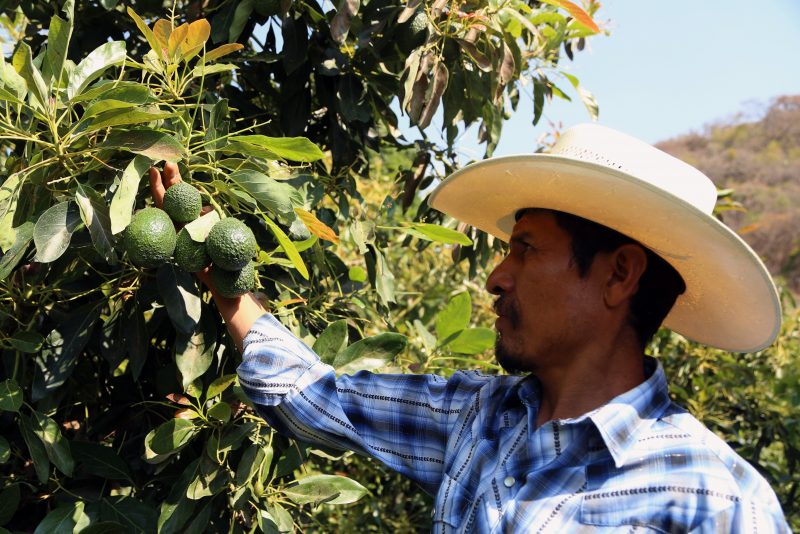Mexican avocado town lives with twin threats: volcano and Trump
A farmer works at an avocado plantation in El Carmen ranch in the community of Tochimilco, Mexico (Jose CASTANARES)
Tochimilco (Mexico) (AFP) – The avocado growers of Tochimilco, a small village in central Mexico at the foot of the Popocatepetl volcano, are used to it threatening them with spurts of molten rock and ash.
The last thing they needed was US President Donald Trump spewing fire at them, too.
But Trump’s incendiary rhetoric on closing the US-Mexican border has become arguably the biggest threat to the avocado growers’ livelihoods since “Popo” angrily awakened 25 years ago after a long dormant period.
Short of a full-on Vesuvian eruption, the worst thing that could happen to Tochimilco’s avocado growers would probably be for Mexico to lose access to the US market, the destination for 80 percent of the country’s avocado exports.
“When we hear Trump talk about the wall, about (closing) the border, we know it would be damaging for us,” said Genaro Ramirez, a veteran avocado grower with gray hair peeking out from under his cowboy hat, who was taking a break to attend the village’s avocado fair.
“Americans love our product, they buy a lot of it. When we export to the United States, they pay us in dollars, and that is a big help to the Mexican economy,” he told AFP.
Mexico is the world’s largest producer of avocados — nearly two million tonnes last year.
Research suggests the domesticated avocado tree originated here, and the indigenous Nahuatl language even gave us the word “avocado” — from “ahuacatl,” which, curiously, can also mean “testicle.”
The United States is meanwhile the world’s largest importer of avocados.
From avocado toast to Super Bowl guacamole, the green fruit has become not only a dietary but a cultural staple in the US.
America’s avocado craze has been fed by research highlighting the health benefits of the food, plus a massive expansion of supply, thanks to the easing of import restrictions on Mexico over the past couple of decades.
The roughly $2 billion of avocados that Mexico now exports to the United States each year have become a catch-all symbol for US-Mexican trade.
– Kick in the ‘ahuacatl’ –
So it came as a real kick in the “ahuacatl” to both American consumers and Mexican avocado growers when Trump threatened to close the border if Mexico did not “immediately stop ALL illegal immigration coming into the United States.”
He dialed back the imminence of the threat last Thursday, saying he would first impose 25-percent tariffs on vehicles imported from Mexico if the border situation did not improve within a year, and then close the gates if that failed.
But by then, an avocado panic had erupted.
Media reports warned that the United States would run out of avocados in three weeks if Trump followed through, and US avocado prices leapt 34 percent last Tuesday.
Amid the frenzy, various experts asked whether reducing the entire $600-billion-plus US-Mexican trade relationship to a single fruit was overly simplistic.
Satirical newspaper The Onion jumped in with an article on the supposedly looming crisis. “Hopefully, this just means more jobs for patriotic American fruits,” said one fake interviewee.
But in Tochimilco, Trump’s threats are no laughing matter.
“If (Trump) doesn’t want (Mexican avocados) anymore, we’re going to lose a lot of money, a lot of jobs. What would people do for work?” said Donato Amelco, an avocado grower with a bushy gray mustache who was tasting the different dishes at the avocado fair.
– Avocado mousse, popsicles, jam –
The fair is an annual celebration of the avocado in its many forms — not just guacamole, but also avocado mousse, popsicles, ice cream, jam, cakes and more.
Presiding over it all is the avocado queen — this year a beaming young woman named Wendy Galicia.
With its mild climate and two harvests per year, Tochimilco is a perfect spot for growing avocados — Popocatepetl notwithstanding — and the industry is a cornerstone of the local economy.
Avocado trees dot the surrounding area, stretching up the base of the towering volcano that looms over the community of 3,000 people, a lush green village built around a striking colonial-era monastery.
The area is home to around 200 small-scale avocado farms. They sell their product to intermediaries, who bring it to market.
Most of the village’s avocados probably remain in Mexico — which, despite being the world’s biggest exporter, also consumes 78 percent of the avocados it produces.
But farmers here would not be insulated from the effects of a US border closure, which analysts say would create an avocado glut and price crash on the Mexican domestic market.
Tochimilco residents, who remain deeply attached to their indigenous culture and beliefs, are trying to see it all with the same calm eye they keep on “Popo.”
“The volcano never scares us,” said Juana Analco, another avocado grower.
“Every year we bring it offerings so it will continue giving us its abundance.”
Some might wish the same would work with Trump.
Disclaimer: Validity of the above story is for 7 Days from original date of publishing. Source: AFP.


